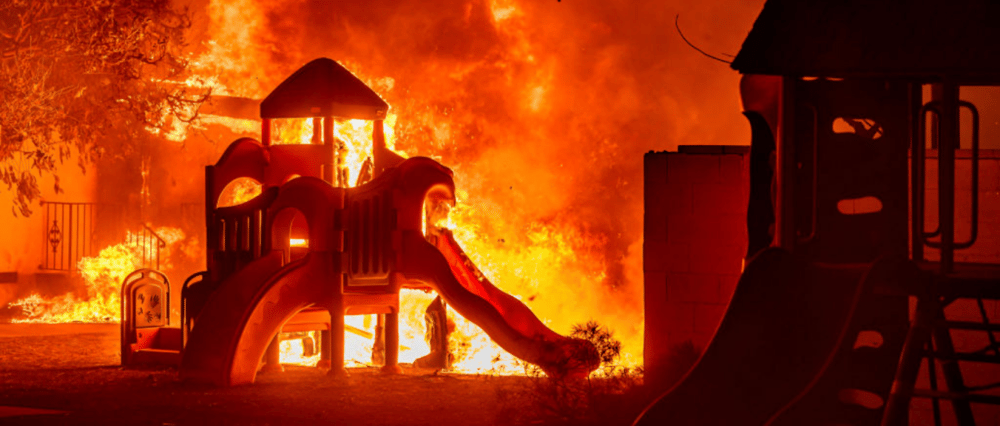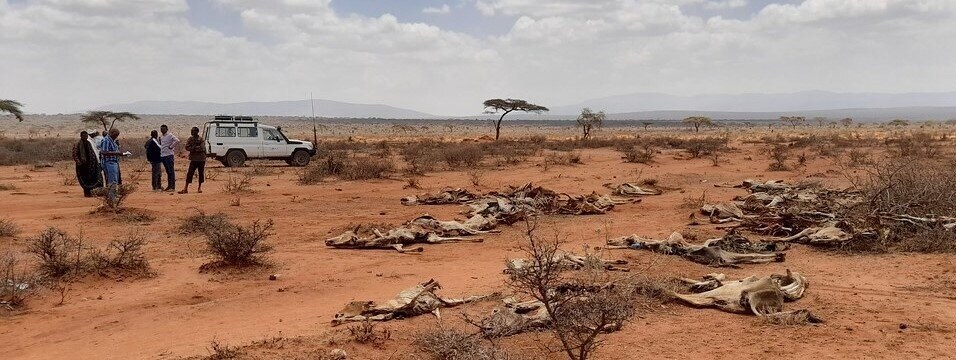We’re going to see another horrible flood in New England. It’s just a matter of when and where. If it’s in Providence, will people in Boston care? If it’s in Boston, will people in Providence care? Maybe it’ll be in Vermont; floods don’t require oceanfront property. Wherever it happens in our region, should we expect Californians to put aside their sadness about wildfires to care about our global warming symptoms? Let’s be honest. When we see Los Angeles burn, don’t we think for a second, “At least it’s not here, at least it’s not me”?
We Discount Climate Damages By “Othering”
There seems to be a tragic disconnect between the facts we know and how we process them as citizens. The hard science of climate change – how it happens and what it means – is well understood. And so is the science of mitigation, which is about what we need to do to ameliorate the problem by reducing emissions. But where we are failing each other is in the social sciences.
Discounting by Distance
The warming, and the cause of our problems, is global. But the effects strike locally and personally. We bumble along, playing Russian Roulette, with some confidence that if we just don’t look up, catastrophe will strike elsewhere – will strike someone else who is ‘other.’ They say it’s a small world after all, but it’s big enough to discount the problem in our minds when there’s distance between us and those who suffer. There’s geographic distance, and there’s emotional or social distance too. The fires in Los Angeles feel a lot closer if you love someone who lives there.

Los Angeles wildfires (Credit: Josh Edelson / AFP via Getty Images)
Discounting by Time
And because the science of climate change is well understood, we know that the average global temperature is 1.5 degrees centigrade above what it ought to be. And that if we keep burning fossil fuels, we are headed for 2.5 degrees in just a matter of time. So where is the concern about future generations? We are burning fossil fuels as if there will be no tomorrow. But we know there will be a tomorrow – for us if we live long enough, or for people we love who outlive us, or for people we will never know personally but who still matter. The science is clear; the later we act, the worse it will be. And yet we distance ourselves, we ‘other,’ with time.
Discounting by Race, Class, and Nationality
We have to acknowledge another ‘othering’ that, collectively, we are engaged in – one based on race. And others based on class and nationality. It’s well known that the impacts of climate change hit communities of color and poorer communities first and worst, and that’s true whether we’re speaking within Rhode Island and Massachusetts, nationally, or internationally. Collectively, our society values the lives of the Black and Brown and people of color, and the lives of poor people, as less-than. Everything we’ve said about Los Angeles is also true about droughts in sub-Saharan Africa, cyclones wiping out small island nations, the threat of land loss in Bangladesh and Sri Lanka, hurricanes hitting Puerto Rico, etc. Remember those devastating floods in Pakistan a few years ago? Here’s an article about just some of the 2024 climate disasters; the list could go on and on and on.

Drought in Ethiopia has resulted in livestock deaths. (Credit: European Union, Silvya Bolliger)
Not Just Climate Impacts
Everything we have said is also true about the impacts felt by the communities – disproportionately Black, Brown, and Indigenous, as well as disproportionately poor – where we place our fossil fuel infrastructure today. (We’re talking about extraction, processing, burning, etc.) Regardless of climate change, we’re all discounting the health harm caused by pollutants from burning fossil fuels.
Let’s Ask Ourselves Why
Of course, there is simply too much suffering – climate-change-induced or otherwise – to feel every single catastrophe at the same level. We would all go insane. What we’re hoping to remind us all with this blog, though, is that we should examine what we pay attention to and why, and ask ourselves: Are we caring for each other?
Quantifying the Damage & Suffering
In a society where money is so important, it may be helpful to quantify the impact of climate change on society. There are many estimates, but the “official” measure is the “social cost of carbon,” the social cost, determined by the federal Environmental Protection Agency. It always seems like a good idea to avoid a cost, right?
The EPA calculates the social cost of carbon dioxide for 2030 at about $200 per metric ton. We say “about” because the actual value depends upon how much the beholder values damage in the future compared to damage today. The social cost of releasing methane (unburned 'natural’ gas) into the atmosphere is about ten times that. In its analysis, the EPA is looking at all sorts of costs – energy costs, impacts on agriculture, labor productivity, sea level rise, health, etc. The report looks at a few different ways of calculating the social cost of carbon, but across the methods, health impacts are by far the biggest portion of the social cost of carbon.
So once again, we apply social science to this. Are we collectively burning fossil fuels because individually we think we will dodge the sickness bullet? If so, there’s not a lot of empathy in that. Moreover, it’s just plain ignorant given how we finance health care. Even if we don’t like each other, your sickness is my problem, and vice versa.
What Can We Do
It's 2025 and on paper, America is better educated now than ever before. But yet we can’t seem to overcome the haziness in our minds caused by distance, time, race, and the foolish dependence upon sheer luck. Pulling it all together, it seems like we just do not have enough regard for each other – especially those who live far away or who will live after we are gone.

2023 Seveso river overflow in Milan, Italy (Credit: Matteo Corner/EPA-EFE/Shutterstock)
Both Massachusetts and Rhode Island have binding laws requiring steady reductions in greenhouse gas emissions over time. The geography is specific, and so is the timetable. But neither state is on track to meet the requirements of 2030. And every time someone in or outside state government calls for serious climate action, bad actors turn on the disinformation machine – telling us we cannot afford offshore wind power, heat pumps, and electric vehicles.
Now here’s the thing: The social cost of carbon is far greater than the cost of mitigation. For diesel fuel (including heating oil) and gasoline, the social cost of carbon amounts to about two bucks a gallon. When methane is burned (in our homes and power plants), its social cost of carbon is less than that of heating oil. But when methane leaks – and it leaks a lot from the well and from pipelines – its social cost is even greater.
Fortunately, it is going to cost a loss less than the equivalent of $2 per gallon to transform our entire economy to clean resources. We’re leaving money on the table due to myopia, short-sightedness, and selfishness.
These are hard facts from the physical sciences. What more do we need? Just common sense and humanity.



Comments